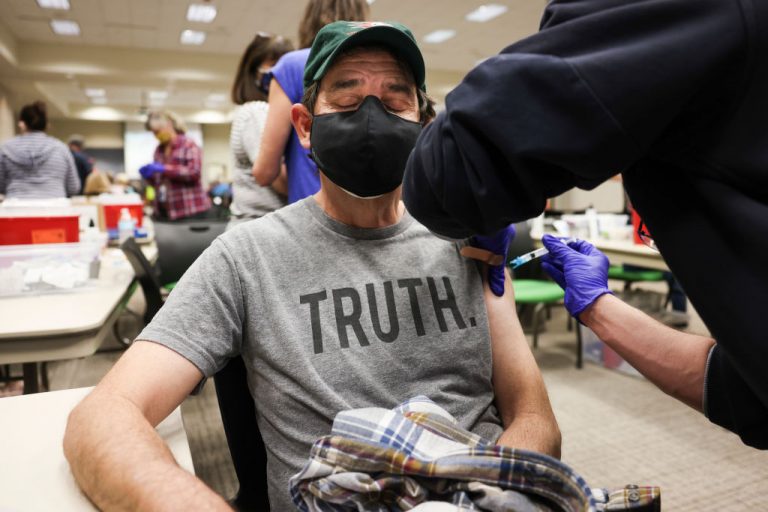Clusters of adverse reactions to the Johnson & Johnson (J&J) vaccine in North Carolina and Colorado caused temporary pauses in vaccination operations at local sites. According to the Centers for Disease Control and Prevention (CDC), approximately six million doses of the J&J vaccine have been administered in the U.S. as of April 10.
The CDC and U.S. Food and Drug Administration (FDA) manages a Vaccine Adverse Event Reporting System (VAERS) database that is “not designed to detect if a vaccine caused an adverse event, but… can identify unusual or unexpected patterns” that require a closer look. Publicly available VAERS reports through April 2 showed 54 deaths, 161 hospitalizations, 478 emergency room or urgent care visits, 16 cases of anaphylaxis, and 9 cases of Bell’s palsy after J&J vaccination.
On April 7, at the Dick’s Sporting Goods Park in Commerce City, Colorado, 11 people suffered immediate adverse reactions after receiving the J&J vaccine, including nausea and dizziness. Over 1,700 people received the vaccine that day, and another 640 people who were scheduled to get the jab were automatically rescheduled to receive the Pfizer vaccine on April 11.
Medical staff on site determined that two people should be taken to the hospital, while the remaining nine recovered after some rest and hydration with juice and water.
Colorado’s Centura Health stated that the two individuals were transported to nearby hospitals “out of an abundance of caution.” They explained, “We followed our protocols and made the cautious decision – in partnership with the state – to pause operations for the remainder of the day… Our goal is to continue to vaccinate Coloradans as quickly as possible while keeping our patients’ safety at the forefront.”
Success
You are now signed up for our newsletter
Success
Check your email to complete sign up
A press release from The Colorado Department of Public Health & Environment expressed reassurance to the public, stating that the “reactions are typically immediate… This event is not impacting other vaccine providers.” Scott Bookman, the Colorado COVID-19 Incident Commander, said, “we are so grateful that the clinic today properly observed and helped patients with immediate side effects.”

He continued, “We know it can be alarming to hear about people getting transported to the hospital, and we want to reassure Coloradans that the CDC and public health are closely monitoring all the authorized vaccines continually. From what we know, today’s side effects were consistent with what can be expected.”
Vaccine adverse reactions in North Carolina
On April 8, workers at the PNC Arena in Raleigh, North Carolina stopped administering the J&J vaccine for the day after 18 people experienced adverse reactions. While 14 of the cases were relatively minor, four of the people with adverse reactions were taken to the hospital for evaluation. A total of 2,300 vaccines were administered that day before operations were shut down.
A Wake County press release later that Thursday explained the situation, stating that the decision to shut down was made “in partnership with the NC Department of Health and Human Services and after consulting with the manufacturer.” The statement also pointed out that 4.5 million people in the U.S. had received the J&J vaccine at the time and that the adverse effects “were consistent with known common side effects from receiving the vaccine.”
Wake County Public Health’s Medical Director Kim McDonald said, “we are working with [NC Department of Health and Human Services] NCDHHS and the CDC to further evaluate the situation to assure everyone is confident in the continued safety of our vaccine operations.”
Those who were scheduled to receive the J&J vaccine at the PNC Arena that day were given the choice to either receive the Pfizer vaccine instead or reschedule their J&J vaccination for after the evaluation was completed. “Wake County plans to hold and store any J&J vaccine until additional information is collected,” the press release stated.
With reporting from Steven Li.
















